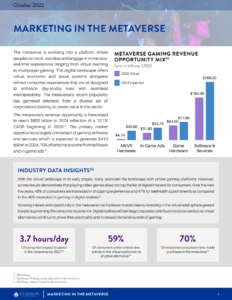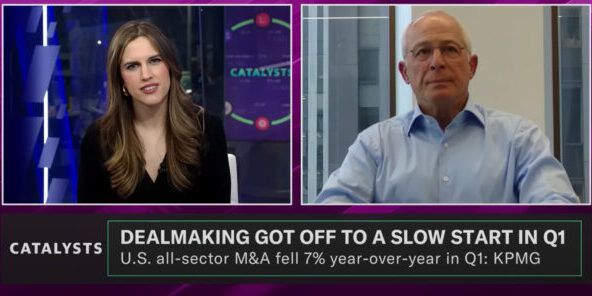Marketing in the Metaverse
The metaverse is evolving into a platform where people can work, socialize and engage in immersive, real-time experiences ranging from virtual learning to multiplayer gaming. The digital landscape offers virtual economic and social systems alongside refined consumer experiences that are all designed to enhance day-to-day lives with seamless interoperability. The metaverse’s recent popularity has garnered attention from a diverse set of corporations looking to create value in the sector.
The metaverse’s revenue opportunity is forecasted to reach $800 billion in 2024 reflective of a 13.1% CAGR beginning in 2020. The primary market opportunity is largely comprised of gaming software and services which is expected to generate $413 billion in 2024, 70% of which is to come from software and in-game ads.
INDUSTRY DATA INSIGHTS
With the virtual landscape in its early stages, many associate the landscape with online gaming platforms. However, survey results demonstrate that playing video games does not top the list of digital interests for consumers. Over the next five years, 48% of consumers are interested in shopping experiences and 47% for telehealth appointments as compared to the 40% interested in gaming in digital realities.
Growing interest and opportunity in the metaverse has footwear brands heavily investing in the virtual retail sphere geared toward augmenting the consumer experience. Digital realities will see large corporate contributions across sectors as virtual alternatives continue to prove their practicality and increased demand outside of gaming.
GENERATING TANGIBLE VALUE IN A VIRTUAL WORLD
The metaverse is quickly being recognized as the single biggest growth opportunity over the next decade for several industries. Most enterprise efforts seen in the digital reality space have been focused on marketing operations, as well as virtual events and meetings. On the consumer front, e-commerce and advertising are expected to generate the most value. However — when looking at use case potential from a corporate lens – verticals, including media, advertising, telecommunications, retail and banking are projected to contribute most to the metaverse’s forecasted $5 trillion in impact by 2030.
Companies and institutions from a variety of fields have already established clear pathways for capitalizing on the interoperability and value prospects of digital landscapes.
ADVERTISING AND BRAND ACTIVATION IN THE METAVERSE
Given the level of capital being invested in the metaverse by gaming focused companies, the traction the metaverse has gained presents marketers with a newfound scope to captivate consumers. Unique market dynamics driving value in the metaverse must be recognized for such marketing efforts to prove fruitful. Catering to the consumer in the virtual landscape requires companies to clearly define their target audience and subsequently identify metaverse platforms best-fit for promoting their products and brands. The market’s current demographic consists largely of Gen Z consumers – a consumer population accustomed to highly innovative experiences who influence $500 billion in annual purchases – making high-quality integration a must for all companies looking to advertise.
Forbes indicates that the next few years are critical for companies navigating the metaverse and its potential for advertising. Gaming has so far been the clear pathway for marketing efforts by brands in digital landscapes. For example, Air Jordan capitalizing on Fortnite’s 350 million+ monthly active users by partnering with Epic Games to offer virtual basketball courts, a virtual Air Jordan museum and avatar wearable shoes. It is also noted that other types of advertisements might take the form of interactive digital billboards or banners in a virtual sports game showcasing a brand’s metaverse products. The direct-to-avatar economy is expected to top $1 trillion by 2030, which would make it the largest digital economy. The metaverse creates a viable, lucrative route for media and retail firms to initiate inventive marketing campaigns. In conclusion, the metaverse offers possibilities for brands to market themselves, connect with younger target audiences and drive organic growth in novel ways as the internet and economy expand into digital reality.
Click below to read the article from the Media & Entertainment Group.






